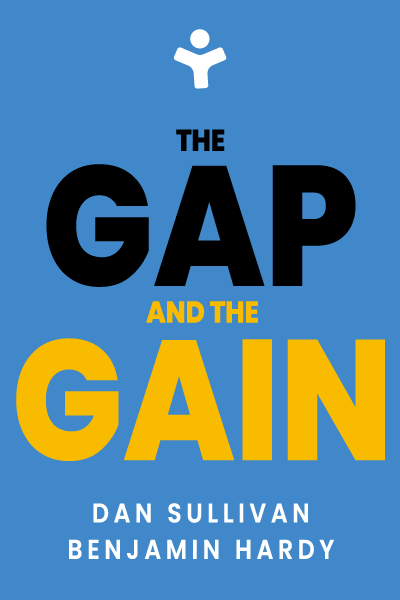
The Gap and The Gain: The High Achievers' Guide to Happiness, Confidence, and Success
by Dan SullivanThe Gap and The Gain offers a fresh perspective on happiness. It challenges the notion that happiness is something to be pursued in the future. Instead, it shows you how to experience happiness and fulfillment in the present moment. With practical insights and strategies, you'll learn how to cultivate gratitude, contentment, and joy in your daily life.
Experiencing True Happiness and Success
We may not realize it, but happiness and success usually come from within and cannot be found in external sources. This means that we can be both happy and successful without relying on material possessions or other people's opinions.
Therefore, instead of relying on external validation, it's important to recognize your past accomplishments and successes. Doing so boosts your confidence and encourages you to continue learning and growing from within, which can ultimately lead to greater happiness and success.
But even if you're not successful yet, you can still feel content and happy. That's because external validation is not necessary for happiness. Dan Jansen, a famous speed skater, is a great example of this. He was already content and successful before winning the gold medal, showing that true happiness and success come from within.
And if we want to be truly happy, internal motivation is the key. When you are motivated from within, you are more likely to enjoy the journey toward achieving your goals rather than just focusing on the end result.
Actions to take
Becoming Self-Determined
Many schools seem to prioritize conformity over individual success, teaching students to measure themselves against external standards set by society and the education system. This can result in low self-esteem and feelings of inadequacy among students.
Additionally, social media can exacerbate this issue by promoting external ideals and pressuring individuals to conform. Advertisers invest significant resources in shaping our identities and creating unrealistic expectations, leading to mental health issues such as low self-esteem and depression.
It's crucial to recognize that true success cannot be defined by anyone else but ourselves. Establishing our own criteria for success is essential to fostering self-determination and building an internal reference system.
By doing so, we can measure our progress against our own goals and values rather than external standards or societal norms. This approach leads to a more fulfilling life as it helps us achieve our true aspirations.
Actions to take
Framing Our Experiences
Our perception of events and situations plays a critical role in determining their impact on us. This is the basis of epigenetics, which focuses on understanding how environmental factors can affect gene expression. According to this theory, the context or framing of an experience is more important than the experience itself in shaping its meaning and effect.
In other words, it's not the content of an experience that matters most, but rather the lens through which we view it. Our brains automatically assign meaning to events based on our past experiences, beliefs, and emotions. This meaning, in turn, determines the psychological and physical impact of the experience.
Actions to take
Measuring Progress
The Conscious Competence Learning Model is a four-stage learning theory that explains the process of automaticity.
Basically, the model suggests that as we learn, we go through four stages of development. At first, we're unaware of what we don't know. Then, we become aware of what we don't know, and we begin to learn. Next, we practice what we've learned until it becomes second nature, and finally, we master the skill or knowledge, and it becomes automatic.
While we're learning, it's important to keep track of our progress and celebrate our achievements. One way to do this is to record our gains, achievements, improvements, and new skills (GAINS). This helps us see how far we've come and motivates us to keep going.
But it's not just about looking forward - it's also important to reflect on our former selves from time to time. Harvard psychologist Daniel Gilbert found that when people take the time to reflect on their past, they realize how much they've changed over time.
When we look back at our former selves, we may feel embarrassed by who we were a year ago, and that's perfectly normal. In fact, anyone who is not embarrassed by their past self probably hasn't learned enough. It is essential to view every experience as an opportunity for growth and to strive to outgrow our former selves continuously.
Actions to take
Celebrating Your Wins
There are several effective strategies that you can implement to achieve success.
First and foremost, visualization and getting adequate sleep are crucial. Did you know that studies suggest that a good night's sleep can boost creativity? To ensure that you're getting enough rest, it's recommended to establish a consistent sleep schedule and avoid using electronic devices before bedtime.
Another effective strategy is the 80/20 principle, which suggests that 80 percent of your results come from just 20 percent of your activities. Instead of trying to do everything, focus on the most impactful actions to achieve the best possible outcomes.
Finally, it's essential to keep track of your progress and celebrate your accomplishments. Writing down at least three things you've achieved every day can help you stay motivated and feel like you're making progress toward your goals.
Actions to take
Don’t just read. Act.


